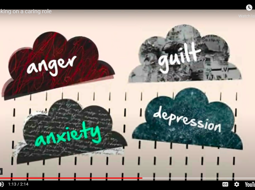Caring for someone with complex needs
There are a number of different conditions that can affect how someone communicates and interacts with the world. Someone's needs can really vary from needing round-the-clock care, to just needing clearer communication and more time to do things. Here we have some guidance to help.
Where can I find specialist support?
Organisations like The National Autistic Society, Ambitious about Autism and the The ADHD Foundation offer an array of useful resources, confidential expert advice and support for family members and friends.
Here are some useful links:
Resources and guides from the National Autistic Society
autism.org.uk/advice-and-guidance/resources/downloads
Factsheets and guides from Ambitious about autism
ambitiousaboutautism.org.uk/information-about-autism/health-and-wellbeing/resources
The ADHD Foundation has a resource hub for parent carers of children with ADHD
adhdfoundation.org.uk/resources/
If you have a specific query, you may find these services helpful:
The Child Autism UK helpline: childautism.org.uk/for-families/autism-helpline/
The Mencap Learning Disability helpline: mencap.org.uk/advice-and-support/learning-disability-helpline
Contact helpline – for families of disabled children:
contact.org.uk/about-contact/contact-us/
You may need support for your own wellbeing too, especially if you're looking after someone whose behaviour can be erratic and difficult to cope with at times.
Support from the National Autistic Society:
autism.org.uk/what-we-do/support-in-the-community/family-support
autism.org.uk/advice-and-guidance/Topics/diagnosis/disclosing-your-autism/parents-and-carers
Support from Ambitious about Autism:
ambitiousaboutautism.org.uk/information-about-autism/early-years/support-for-families
Support from Contact:
contact.org.uk/help-for-families/
Carers UK:
There may be others who will be in a similar situation to you. Our free Carers UK Care for a Cuppa sessions offer an opportunity to connect with other carers, and you can find out more about relevant topics through our Share and Learn sessions:
Our guides and sources of support
We have worked alongside specialists with knowledge of autism and other conditions to produce some helpful resources about matters that can cause anxiety or concerns.
Autism support
In the video below, we hear from Geoff Evans who is an autism trainer and consultant, working in the field of autism for 40 years. This session involves a presentation and Q&A. Introducing autism and its wide range of characteristics, Geoff explores issues relating to caring for someone with autism or having autism yourself. (Information was correct at the time of recording. Recorded May 2023)
Support with day-to-day life
It's also a good idea to request a needs assessment if the person you are looking after hasn't already had one. The term for this may differ depending on where you live, but essentially this is a review of someone's needs, looking at what will help improve their day-to-day life.
As an unpaid carer, you may also be eligible for a needs assessment. If you are struggling with health issues and are under strain, you can also request one for yourself. You can have this as well as a carer’s assessment.
Depending on where you live, there may be a waiting list for this support. It is worth checking with your local authority or health and social care trust (in Northern Ireland). If you find you are waiting for support, you may find this factsheet helpful to seek sources of support in the meantime: 'While you are waiting'.
Arranging care for someone
If you reach a point, where you need additional support to look after someone, there are various options to consider. Everyone's circumstances are different so it may be a case of trial and error at first. However we hope to make these difficult decisions easier for you by providing lots of guidance and information to help you make informed choices.
Using a care agency can be more expensive than employing a care worker directly, but there are certain responsibilities to fulfil if you are taking on the role of an employer to recruit someone directly. See our online pages for more information and guidance:
Fore more information about finding care agencies, see this page.
For more information about directly employing a care professional, see this page.
Connecting with others
You can connect to our forum, Carers Connect, to read what others have experienced and share tips. You might find it helpful to search for specific terms like 'dyspraxia' to find threads with relevant discussion.
To post topics or join a conversation on our forum, you need to become a member first. This is free and can give you access to some additional support in case you need it – see this link: join us. You can unsubscribe at any time.

How do I take time out?
If you feel in need of a break, you should not feel guilty about making this happen. Often, it is easier to put the needs of those we care for before our own.
See our webpage, Taking a break, for some ideas on how to take some time out. On this page, you can also download a factsheet featuring a list of organisations that can help with offering a break or finding respite care.
The animated guide below provides some further suggestions of ways to cope with someone's unpredictable behaviour if this is becoming increasingly exhausting or difficult for you. You can also find lots of tips on our wellbeing pages for ways to stay resilient during tough times: Your health and wellbeing | Carers UK.
Coping with behaviour that can be challenging
This video explores some of the difficulties that can arise from a person's condition(s) if their medication or emotions lead them to behave in unexpected or unpredictable ways. There are some key tips shared to help you feel more supported and calmer.




